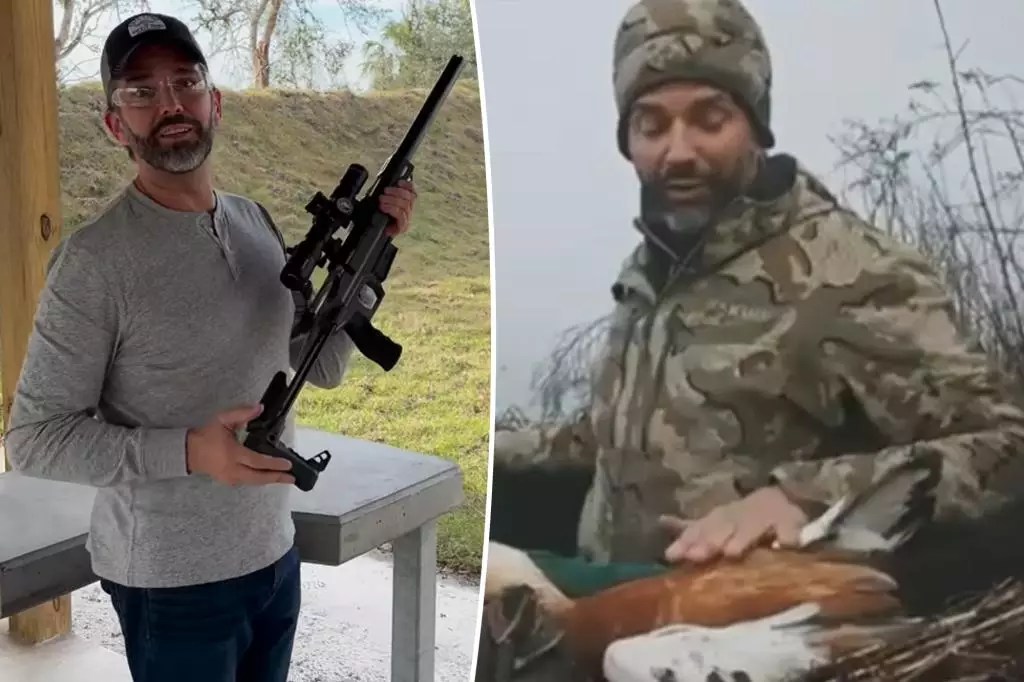In recent weeks, Donald Trump Jr. has inadvertently thrust himself into the spotlight, igniting a significant uproar among animal rights activists and local politicians in Italy. The controversy centers on a hunting excursion that Don Jr. participated in, which reportedly involved the shooting of ducks, including what some claim to be a rare species. The unfolding drama not only highlights the contentious nature of hunting and conservation but also raises questions about legal responsibilities and ethical practices in wildlife interaction by high-profile individuals.
The storm began with the release of a video showcasing Trump Jr. seemingly partaking in duck hunting near a picturesque lagoon outside Venice. Eye-catching visuals of the armed party in camouflage attire quickly raised eyebrows, especially when it was revealed that among the ducks, one appeared to have unique coloration, suggesting it could be a Ruddy Shelduck—a bird considered rare in European territories. The incident drew immediate backlash from local environmentalists who charged that the behavior displayed by Trump Jr. was problematic, not just ethically but also legally.
Local politicians have expressed deep concerns, claiming that Trump Jr.’s foreign status may have influenced the legality of his participation in the hunt. According to Andrea Zanoni, a regional green party politician, hunting laws in Italy stipulate that only residents of specific regions can obtain hunting licenses. This dimension of the debate underscores the intersection of nationality and ecological responsibility, especially for well-known figures who may inadvertently set precedents for wildlife interaction.
Adding fuel to the fire, critics question whether Trump Jr. possessed the necessary permits to hunt in Italy or if he adhered to regional hunting laws. His spokesperson, Andy Surabian, contended that the hunting party had complied with all regulations, defending Don Jr. as a conscientious hunter who respects conservation efforts. This assertion, however, did little to quell the skepticism among critics and activists, who now demand a thorough investigation into the matter. As demands for accountability multiply, it becomes increasingly vital to explore the broader repercussions of such high-profile hunting incidents.
Zanoni’s comments and additional calls for inquiry by other local politicians suggest that the matter has prompted serious discussions about enforcement of hunting regulations. An MP from the Democratic Party even advocated for legal action if Trump Jr. is found culpable. This proposed accountability reflects a growing sensitivity toward wildlife protection in the face of elite privilege, as many argue that famous figures should be subject to the same rules as everyone else.
The public’s reaction to the incident has been mixed, resonating with sentiments ranging from outrage to indifference. While animal rights activists and concerned citizens have rallied against the purported unlawful hunting activities, there remains a segment of society that either defends Trump Jr. or dismisses the situation as trivial. Such reactions exemplify how issues of wildlife conservation, legality, and ethical hunting practices can be deeply polarizing, particularly when they involve prominent figures embedded in a larger political narrative.
Critics argue that this incident reinforces negative stereotypes surrounding hunting and the treatment of wildlife, as it reopens wounds from past controversies linked to the Trump family. Notably, this is not the first time Trump Jr. has faced backlash regarding hunting practices; a similar controversy arose in 2019 when he allegedly killed a rare species of sheep in Mongolia, which was later permitted retroactively. Such patterns of behavior intensify scrutiny and concern regarding the implications of hunting by elite figures, particularly concerning rare or endangered species.
Ultimately, the unfolding saga of Donald Trump Jr.’s duck hunting trip not only sheds light on individual accountability within wildlife recreation but also highlights the inherent complexities of navigating local laws and cultural sensitivities. For all parties involved, from local politicians to activists, this situation serves as a crucial reminder of the ongoing conversations about conservation, legality, and ethics in hunting practices. The pursuit of accountability in such cases may pave the way for more stringent regulations and greater awareness, both globally and locally, about the implications of hunting activities as they relate to endangered wildlife and international laws. As such, Trump Jr. finds himself not just at the heart of a scandal but also at the center of a much larger discourse on ecological responsibility, human respect for nature, and the nature of privilege.







Leave a Reply